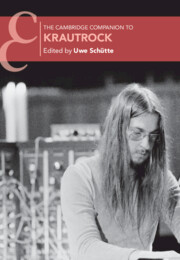Book contents
- The Cambridge Companion to Krautrock
- Cambridge Companions to Music
- The Cambridge Companion to Krautrock
- Copyright page
- Dedication
- Contents
- Illustrations
- Contributors
- Acknowledgements
- Note on Translation
- Introduction
- Part I Context
- Part II Music
- 6 Kraftwerk
- 7 Can
- 8 Tangerine Dream
- 9 Neu!
- 10 Faust
- 11 Cluster/Harmonia
- 12 Popol Vuh
- 13 Ash Ra Tempel, Manuel Göttsching, and Klaus Schulze
- 14 Amon Düül II
- 15 The Flip Side of Krautrock
- Part III Legacy
- Index
15 - The Flip Side of Krautrock
from Part II - Music
Published online by Cambridge University Press: 20 October 2022
- The Cambridge Companion to Krautrock
- Cambridge Companions to Music
- The Cambridge Companion to Krautrock
- Copyright page
- Dedication
- Contents
- Illustrations
- Contributors
- Acknowledgements
- Note on Translation
- Introduction
- Part I Context
- Part II Music
- 6 Kraftwerk
- 7 Can
- 8 Tangerine Dream
- 9 Neu!
- 10 Faust
- 11 Cluster/Harmonia
- 12 Popol Vuh
- 13 Ash Ra Tempel, Manuel Göttsching, and Klaus Schulze
- 14 Amon Düül II
- 15 The Flip Side of Krautrock
- Part III Legacy
- Index
Summary
This chapter deals with the ‘flip side‘ of Krautrock, exploring which political, social, and cultural developments in West Germany in the 1970s were clearly not reflected in Krautrock. The aim is to show that German pop music in the Krautrock era – contrary to its glorification as progressive, avant-garde, and internationalist – was actually conservative, if not restorative, in essential aspects. The chapter demonstrates that, firstly, feminist tendencies are discernible outside Krautrock (e.g. Inga Rumpf or Claudia Skoda). Secondly, the chapter deals with the vibrant music scene of Turkish migrants, which was ignored by German majority society. Thirdly, the chapter focuses on aspects of the appropriation of national traditions in German pop music of the 1970s. It discusses bands like Novalis and Hölderlin, who took up the tradition of German Romanticism, or Achim Reichel, who used the marginalised language form of Low German for his pop music. The chapter establishes a counter-narrative that challenges the prevailing view of the modernising power of Krautrock. Rather, it suggests that Krautrock was decoupled from the actual modernising trends in 1970s West Germany, such as the women‘s movement and the multicultural diversification of society.
Keywords
- Type
- Chapter
- Information
- The Cambridge Companion to Krautrock , pp. 233 - 246Publisher: Cambridge University PressPrint publication year: 2022

